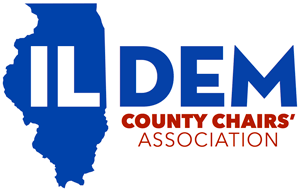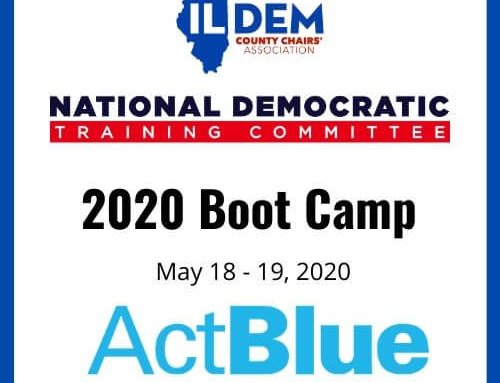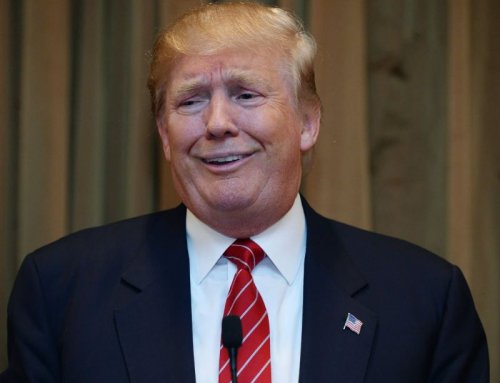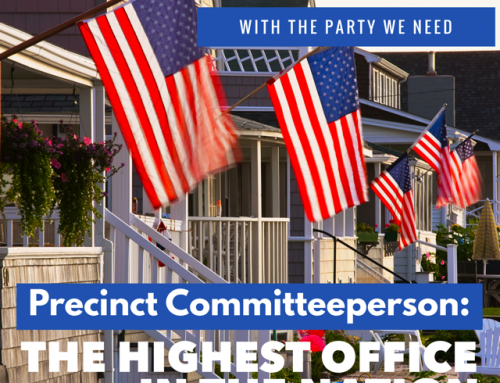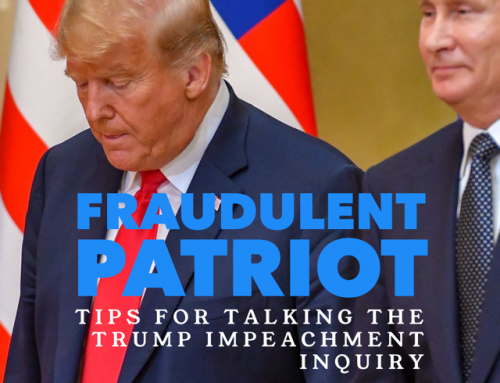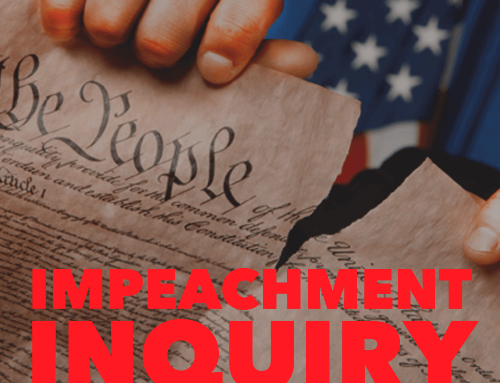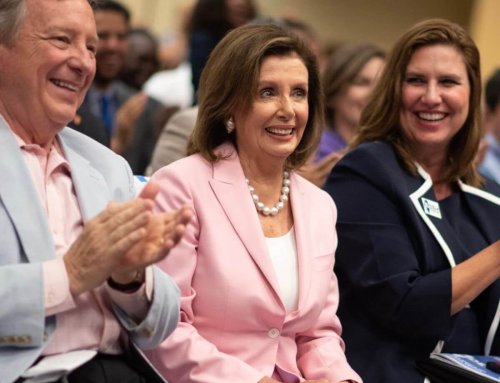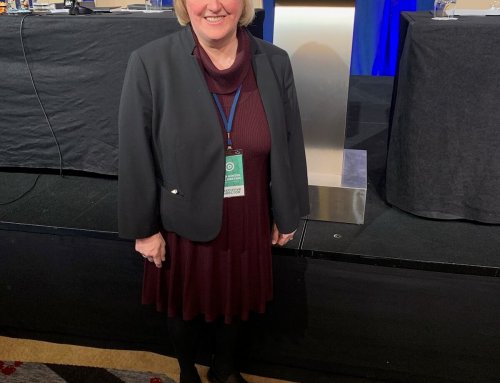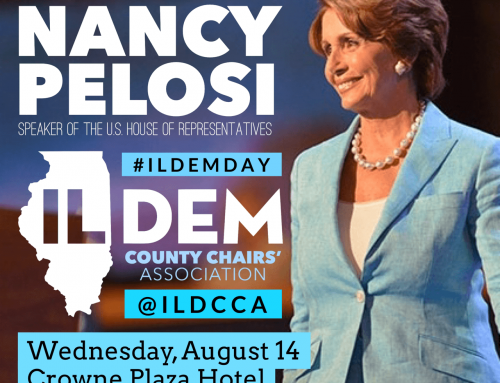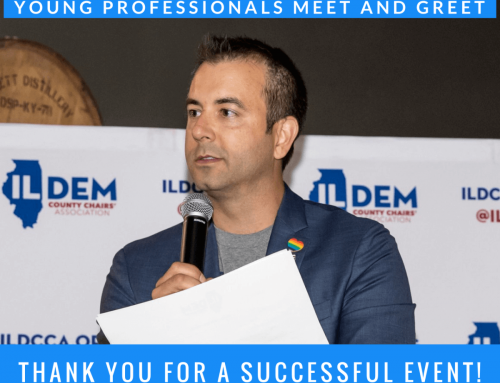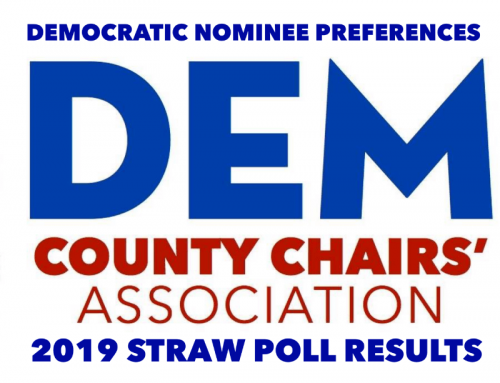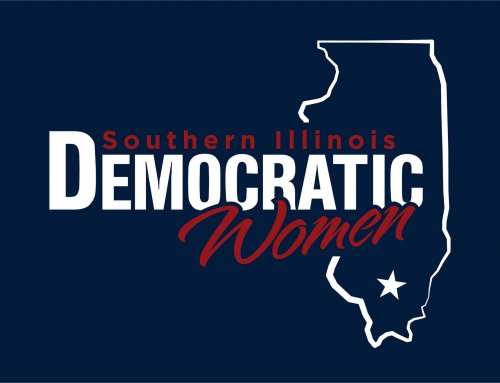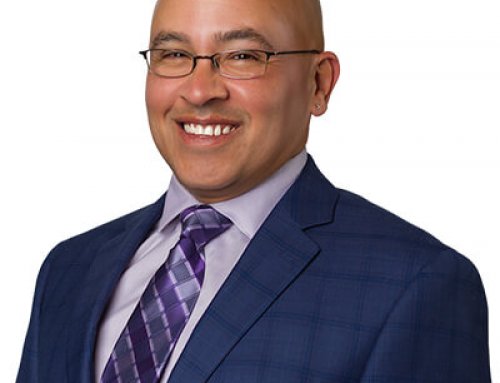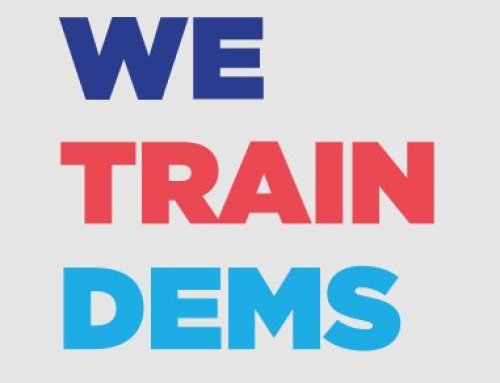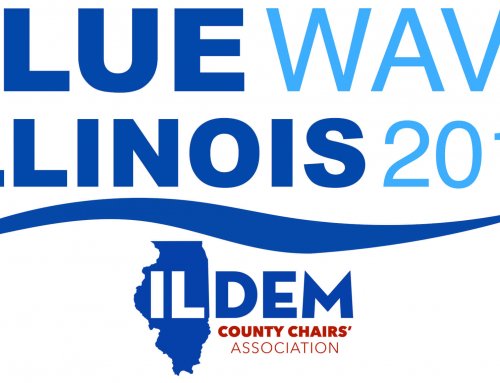UPDATE – BE PREPARED TO RESPOND TO THE GOP MISINFORMATION
by Dan Kovats, IDCCA Executive Director
@ILDCCA @dankovats
So you made it through Thanksgiving with your family and, hopefully, you are still welcomed at the upcoming holiday festivities. While you were prepared for one day of conspiracy theories and illogical defenses of Trump from the conservative members of your family, the holiday season presents a much longer time frame where you’ll need to be on guard. Just remember one thing, no matter how many facts you present to your Faux News watching relatives, it is going to be next to impossible to change their minds. Hopefully there is a good holiday movie on or at least some good eggnog to lighten the mood.
I will also reiterate my warning from last month. If you have a conservative family member that is itching for a political debate, it might be best to Let It Go. You should be able to run circles around them given all of the facts that have come out from the House Committees. That could severely dampen the mood at what should be a good time celebrating with your family and friends. If your anything like me though, you’ll end up wanting to fight back once your crazy uncle starts spouting the MAGA talking points.
Need to Impeach – A great resource for talking points on the need to Impeach Trump.
Impeachment Talking Points #1 – IDCCA tips for highlighting the White House’s betrayal of the nation.
Impeachment Talking Points #2 – IDCCA talking points
Impeachment Explained: The ultimate guide to the Donald Trump impeachment saga – A consistently updated series of news stories and explainers tracking the facts and revelations of the criminal enterprise of the Trump impeachment inquiry.
The Asset – An investigative podcast produced by The Moscow Project and hosted by Max Bergmann, a former intelligence analyst. Season two delves into Trump’s phone call with the Ukrainian President that prompted a government whistleblower to signal corruption.
UPDATED RESPONSES TO GOP TALKING POINTS… (from Washington Post, JM Rieger, 12/4/19)
Who: Rep. Brad Wenstrup (R-Ohio)
What he said: “I think it’s perfectly appropriate to ask a foreign leader to look into potential corruption,” Wenstrup said on Oct. 1.
Context: On Sept. 20, Trump tweeted that his call with Ukrainian President Volodymyr Zelensky was “pitch perfect.” Since then, Trump has called his call “perfect” more than 150 times, according to a Fix review of Factba.se transcripts.
In that call, Trump asked Zelensky for investigations of the actions of Joe Biden and his son, Hunter, and of a debunked conspiracy theory that Ukraine and not Russia hacked the Democratic National Committee in 2016. Still, at least two dozen congressional Republicans have refused to say whether Trump’s call was appropriate. After the call, the Trump administration moved the transcript to a highly classified server and restricted access to it, something officials have said is at odds with long-standing White House protocol.
Further, Trump allies have floated at least two dozen defenses of the call, suggesting that it was hardly “perfect.”
2. There was no quid pro quo
Who: Rep. Michael McCaul (R-Tex.)
What he said: “The testimony that’s been made public is that there’s no quid pro quo here,” McCaul said Oct. 17.
Context: McCaul’s comment came hours after acting White House chief of staff Mick Mulvaney confirmed that there was a quid pro quo in Trump’s Ukraine actions and weeks after Sen. Ron Johnson (R-Wis.) also confirmed that there was a quid pro quo.
Since then, four more officials have confirmed a quid pro quo between Trump and Ukraine.
3. The July 25 call was inappropriate but not impeachable
Who: Rep. Mac Thornberry (R-Tex.)
What he said: “I believe that it is inappropriate for a president to ask a foreign leader to investigate a political rival,” Thornberry said on Nov. 10. ” … I do not believe it was impeachable.”
Context: Logic suggests that the call cannot simultaneously be appropriate and inappropriate, as congressional Republicans have said.
4. Trump was expressing his opinion on the July 25 call
Who: Sen. Kevin Cramer (R-N.D.)
What he said: “I appreciate that we have a president who’s very transparent about his opinions,” Cramer told CNN on Oct. 13.
Context: Cramer said this in response to a question about the appropriateness of Trump calling for Ukraine and China to investigate the Bidens. The chairwoman of the Federal Election Commission has clarified more than once that it is illegal for U.S. political candidates to solicit “anything of value from a foreign national in connection with a U.S. election.”
5. Even if there was a quid pro quo, it wasn’t a ‘corrupt’ quid pro quo
Who: Sen. John Neely Kennedy (R-La.)
What he said: “The quid pro quo, in my judgment, is a red herring,” Kennedy said Nov. 10. “Here are the two possible scenarios: Number one, the president asked for an investigation of a political rival. Number two, the president asked for an investigation of possible corruption by someone who happens to be a political rival. The latter would be in the national interest. The former would be in the president’s parochial interests and would be over the line. I think this case is going to come down to the president’s intent — his motive. Did he have a culpable state of mind?”
Context: This defense undermines a central Trump defense that there was no quid pro quo.
6. Even if there was a quid pro quo, this happens in foreign policy
Who: Sen. Rand Paul (R-Ky.)
What he said: “There’s always contingencies on aid,” Paul said Nov. 10. “Even President Obama withheld aid. … I would make the argument that every politician in Washington, other than me, virtually, is trying to manipulate Ukraine to their purposes. [Sen. Robert] Menendez tried it. [Sen. Chris] Murphy tried it. [Vice President] Biden tried it. Trump’s tried it. They’re all doing it.”
Context: While the United States has withheld aid to countries, why it withholds aid matters and is central to the impeachment inquiry: Was aid to Ukraine withheld to benefit Trump or to root out corruption consistent with U.S. foreign policy, as Trump says?
The Democratic senators Paul cited did not threaten to withhold aid to Ukraine. And Biden was carrying out official U.S. foreign policy, a position widely supported by Western leaders, when he threatened to cut off aid to Ukraine unless Ukraine’s prosecutor general was fired.
The corruption contingency on U.S. aid to Ukraine, mandated by Congress, was certified by the Pentagon in May. Almost two months later, the White House decided to freeze Ukrainian aid, purportedly to investigate corruption.
7. Trump was unaware of the quid pro quo
Who: Rep. Mark Meadows (R-N.C.)
What he said: “When I get to ask questions, and when you see all of the transcripts, you will understand there is no direct linkage to the president of the United States,” Meadows said Nov. 6.
Context: There have been six public confirmations of a quid pro quo between Trump and Ukraine. For months, Trump’s personal attorney Rudolph W. Giuliani was publicly calling for investigations of the Bidens and of a debunked conspiracy, saying he was acting “solely as a defense attorney to defend my client.”
Whether Trump knew what Giuliani was doing is a central part of the impeachment inquiry.
On Friday, State Department aide David Holmes testified that Trump asked the U.S. ambassador to the European Union, Gordon Sondland, over the phone about the “Biden investigation.” There are reportedly two additional officials who overheard the conversation.
8. Trump is incapable of a quid pro quo
Who: Sen. Lindsey O. Graham (R-S.C.)
What he said: “What I can tell you about the Trump policy toward Ukraine: It was incoherent. It depends on who you talk to. They seem to be incapable of forming a quid pro quo,” Graham said Nov. 6.
Context: Graham’s comments echo a defense first floated by the Wall Street Journal editorial board in October: “Impeachment for incompetence would disqualify most of the government, and most Presidents at some point or another in office.”
Not only did Trump reportedly complain about the Journal op-ed (“If I wanted to do quid pro quo, I would’ve done the damn quid pro quo”), but it was Trump in 2014 who proposed impeaching President Barack Obama for the same thing his defenders now attribute to him: incompetence.
9. Trump’s public call for Ukraine and China to investigate the Bidens was not serious
Who: Sen. Roy Blunt (R-Mo.)
What he said: “I don’t imagine that’s what he was doing,” Blunt said Oct. 6, when asked whether Trump’s call for investigations of the Bidens was appropriate.
Context: Over the past four years, Trump and his allies have downplayed at least 15 of his claims by pointing to Trump’s sarcasm.
Asked four days after Blunt’s comments whether he was joking about asking China to investigate the Bidens, Trump did not say he was joking.
“China has to do whatever they want,” Trump said. “If they want to look into something, they can look into it. If they don’t want to look into it, they don’t have to.”
10. Interpreting Trump’s actions amounts to ‘differences of opinion’
Who: House Minority Leader Kevin McCarthy (R-Calif.)
What he said: “We have differences of opinion, but more importantly, we have a rule of law,” McCarthy said Oct. 29.
Context: After praising the service record of Lt. Col. Alexander Vindman, who said Trump’s July 25 call raised national security concerns, McCarthy said Vindman’s view of the call amounted to “differences of opinion.”
Vindman’s testimony appears to be consistent with the testimony of Jennifer Williams, a State Department adviser to Vice President Pence who was also on the July 25 call and who called Trump’s push for investigations “unusual and inappropriate.”
11. The whistleblower complaint was based on hearsay
Who: Graham
What he said: The “whistleblower complaint is hearsay. … The whistleblower was not on the phone call,” Graham said Sept. 25.
Context: Virtually every claim made by the whistleblower proved true, often via the testimony of multiple officials, including those who were on the July 25 call.
12. The whistleblower complaint was inaccurate
Who: House Minority Whip Steve Scalise (R-La.)
What he said: “A lot of these accusations have turned out to not be true,” Scalise said Sept. 29.
Context: The Washington Post Fact Checker gave Trump four Pinocchios last month for repeatedly calling the whistleblower complaint “inaccurate” and “incorrect.”
13. The whistleblower has a political bias
Who: Scalise
What he said: “The Justice Department or the inspector general determined that the whistleblower does have a political bias,” Scalise said Sept. 29.
Context: While intelligence community inspector general Michael Atkinson wrote in an August report that the whistleblower has an “arguable political bias … in favor of a rival candidate,” Atkinson wrote that “such evidence did not change my determination that the complaint relating to the urgent concern ‘appears credible.’ ”
On Sept. 26, acting director of national intelligence Joseph Maguire testified that the whistleblower operated “in good faith” and followed the law.
14. The whistleblower is part of the ‘deep state’
Who: Sen. Josh Hawley (R-Mo.)
What he said: “It looks to me like another deep-state attack,” Hawley said Sept. 20.
Context: The whistleblower complaint was deemed credible by the intelligence community inspector general and has proved to be mostly true. Additional details of Trump’s dealings with Ukraine outside the whistleblower complaint have also emerged since the complaint was filed.
15. The impeachment inquiry is a secret and unfair process
Who: Rep. Matt Gaetz (R-Fla.)
What he said: “So far [the] impeachment inquiry has been marked by secret interviews, selective leaks, weird theatrical performances of transcripts that never happened and lies about contacts with a whistleblower,” Gaetz said Oct. 23.
Context: While The Post Fact Checker gave House Intelligence Committee Chairman Adam B. Schiff (D-Calif.) four Pinocchios for claiming his committee had not directly spoken to the whistleblower, Gaetz has also decried the closed-door deposition process in the inquiry, leading a group of Republicans into a closed-door hearing Oct. 23.
Except the closed-door deposition process that Democrats are using and Republicans are decrying was passed by Republicans in 2015.
16. Trump didn’t receive his due-process rights
Who: Senate Majority Leader Mitch McConnell (R-Ky.)
What he said: “It seems to me they are still not providing the same kind of basic due-process rights that were provided both Richard Nixon and Bill Clinton. They can’t even get the process right,” McConnell said Nov. 5.
Context: Some Trump allies have defended the president by suggesting that his Sixth Amendment rights are being violated since Trump is not allowed to confront his accusers. But as The Post’s Deanna Paul noted, that guarantee applies only to criminal proceedings and does not include impeachment. Further, Trump has not yet been charged with a crime or with an article of impeachment.
The House-passed resolution formalizing the impeachment inquiry would allow Trump and his counsel to attend all House Judiciary Committee impeachment hearings and question and call witnesses (with a notable caveat).
17. Ukraine said there was no pressure
Who: Rep. Jim Jordan (R-Ohio)
What he said: “President Trump and President Zelensky said no pressure, no linkage,” Jordan said Nov. 17.
Context: Over the past two months, Trump allies have pointed to public comments from Zelensky and Ukrainian Foreign Minister Vadym Prystaiko that the Trump administration did not apply “pressure,” suggesting a quid pro quo therefore could not have occurred.
Not only did Ukrainians know that Trump was withholding security aid before it was released, but a report from the Associated Press — that State Department officials were aware that Ukraine felt pressure from the Trump administration to investigate the Bidens — throws even more cold water on the “no pressure” defense.
18. Ukraine did not agree to any investigations
Who: Jordan
What he said: “The aid was released, President Zelensky didn’t do the statement, he didn’t go out and make a statement,” Jordan said Oct. 23.
Context: In September, Zelensky had committed to an interview with CNN to announce the investigations Trump wanted. After Zelensky had committed to the interview but before it was set to occur, Trump released the frozen security aid, two days after Democrats announced an investigation of Trump’s dealings with Ukraine.
19. Ukraine did not know the security aid was held up
Who: Jordan
What he said: “The Ukrainians didn’t know aid had been held up at the time of the phone call,” Jordan said Oct. 31.
Context: While it remains unclear whether Zelensky knew at the time of the July 25 call whether the security aid was frozen, Ukraine was aware of the frozen aid before it was released Sept. 11.
Additionally, the special envoy to Ukraine at the time, Kurt Volker, texted Andriy Yermak, a senior aide to Zelensky, less than 30 minutes before the July 25 call.
“Heard from White House — assuming President [Zelensky] convinces trump he will investigate / ‘get to the bottom of what happened’ in 2016, we will nail down date for visit to Washington,” Volker texted.
It is worth remembering that Trump was not just withholding security aid from Ukraine — he was also allegedly withholding a White House meeting with Zelensky, something Trump promised Zelensky during his April phone call with him.
20. Ukraine ultimately got the security aid
Who: Scalise
What he said: “The real bottom line is he got the money. Ukraine got the money,” Scalise said Nov. 17.
Context: Scalise’s argument implies Trump’s pressure campaign was appropriate because nothing came of it. But attempted actions can still be impeachable.
Some congressional Republicans have also argued Trump has helped Ukraine more than Obama did because he provided lethal aid.
While it is true that Trump provided lethal aid and Obama did not, the Obama administration still authorized more than $600 million in security assistance to Ukraine from 2014 to 2016.
21. Impeachment is a coup d’etat
Who: McCarthy
What he said: “It is clear now more than ever this is a calculated coup,” McCarthy said Nov. 10.
Context: Considering removing a president from office via procedures outlined in the Constitution is not the same as a coup, defined as a violent overthrow of the government.
22. Democrats wanted to impeach Trump as soon as he was inaugurated
Who: Rep. Michael R. Turner (R-Ohio)
What he said: “Adam B. Schiff has been on a three-year quest to impeach this president,” Turner said Nov. 17. ” … A majority of the Democrats were already on record of wanting to impeach this president before the Ukrainian call even happened.”
Context: A majority of House Democrats did not support impeachment or an impeachment inquiry of Trump before his July 25 call, according to a Post analysis. Schiff did not announce his support for the inquiry until after House Speaker Nancy Pelosi (D-Calif.) announced one on Sept. 24.
And while Trump’s allies have argued Democrats were laying the groundwork for impeachment before Trump was sworn in as president, the then-chairmen of the House and Senate Homeland Security committees, Republicans McCaul and Johnson, were suggesting days before the 2016 election that Hillary Clinton could be impeached if elected. The impeachment, they said, would be based on her use of a private email server and alleged influence peddling while she was secretary of state.
“Assuming she wins and the investigation goes forward and it looks like an indictment is pending, at that point in time under the Constitution, the House of Representatives would engage in an impeachment trial,” McCaul said Nov. 2, 2016. “It would go to the Senate, and impeachment proceedings and removal would take place.”
Clinton was never indicted.
23. Sondland never directly heard Trump mention Ukrainian security aid
Who: Turner
What he said: “No one on this planet told you that President Trump was tying aid to investigations. Yes or no?” Turner asked Sondland on Nov. 20. Sondland testified that this was not said to him.
Context: Sondland testified that there was a quid pro quo regarding both an Oval Office meeting and aid money. The former he said he had been aware of for months and was based on the president’s orders. The latter, he said, was a presumption based on what he knew of Trump’s wishes. That’s what Turner was pressing him on.
“I don’t recall President Trump ever talking to me about any security assistance, ever,” Sondland also testified. He said his knowledge about why the meeting was held up informed his thinking when he realized the aid was being withheld.
24. It’s the media’s fault
Who: Rep. Devin Nunes (R-Calif.)
What he said: “The media of course are free to act as Democrat puppets, and they’re free to lurch from the Russia hoax to the Ukraine hoax at the direction of their puppet masters, but they cannot reasonably expect to do so without alienating half the country who voted for the president they’re trying to expel,” Nunes said Nov. 19.
Context: Putting aside that the vast majority of reporting on Russian election interference and the Trump campaign’s attempts to leverage that interference was accurate, Nunes appears to blame the impeachment inquiry, in part, on the media, while ignoring the role that Trump’s actions played in launching the inquiry.
Ironically, moments before Nunes accused the media of acting as “Democrat puppets” on Nov. 19, he criticized Democrats for shifting strategy to accuse Trump of “bribery” because “quid pro quo” wasn’t “polling well.”
That rhetorical shift by the Democrats had been reported by The Washington Post days earlier.
25. Ukraine interfered in the 2016 election
Who: Kennedy
What he said: “I think both Russia and Ukraine meddled in the 2016 election,” Kennedy said Dec. 1.
Context: Not only is evidence scant that Ukraine interfered in the 2016 election, but the Republican-controlled Senate Intelligence Committee reportedly investigated this theory during the Russia investigation and found “no evidence that Ukraine waged a top-down interference campaign akin to the Kremlin’s efforts to help Trump win in 2016.”
Despite his own finding, Senate Intelligence Committee Chairman Richard Burr (R-N.C.) refused to rule out Ukrainian election interference when asked about the debunked theory on Dec. 2.
“Every elected official in the Ukraine was for Hillary Clinton,” Burr told NBC News. “Is that very different than the Russians being for Donald Trump?”
26. The impeachment inquiry is moving too quickly
Who: Rep. Douglas A. Collins (R-Ga.)
What he said: “The issue that we have to deal with going forward is why the rush?” Collins said Dec. 4. “ … This is a fast impeachment — the fastest we’ve seen — based on disputed facts, on crimes or the services that are made up with the facts to fit each part.”
Context: Collins’s statements came right after professor Jonathan Turley, the Republicans’ witness in the first Judiciary Committee hearing on impeachment, made the same point. The current impeachment inquiry has tracked closely to the timeline of the last House impeachment proceeding against President Bill Clinton. That impeachment inquiry spanned 75 days from when the House formally voted to open an inquiry on Oct. 5, 1998. Depositions for the current inquiry started Oct. 3, but the House did not formalize the proceedings until Oct. 31. Turley emphasized that there are related court cases that have not have time to make their way through the courts in the time Democrats have allotted for the inquiry.
Some House Democrats have privately echoed Collins’s complaint, expressing frustration about the pace of the current inquiry.
